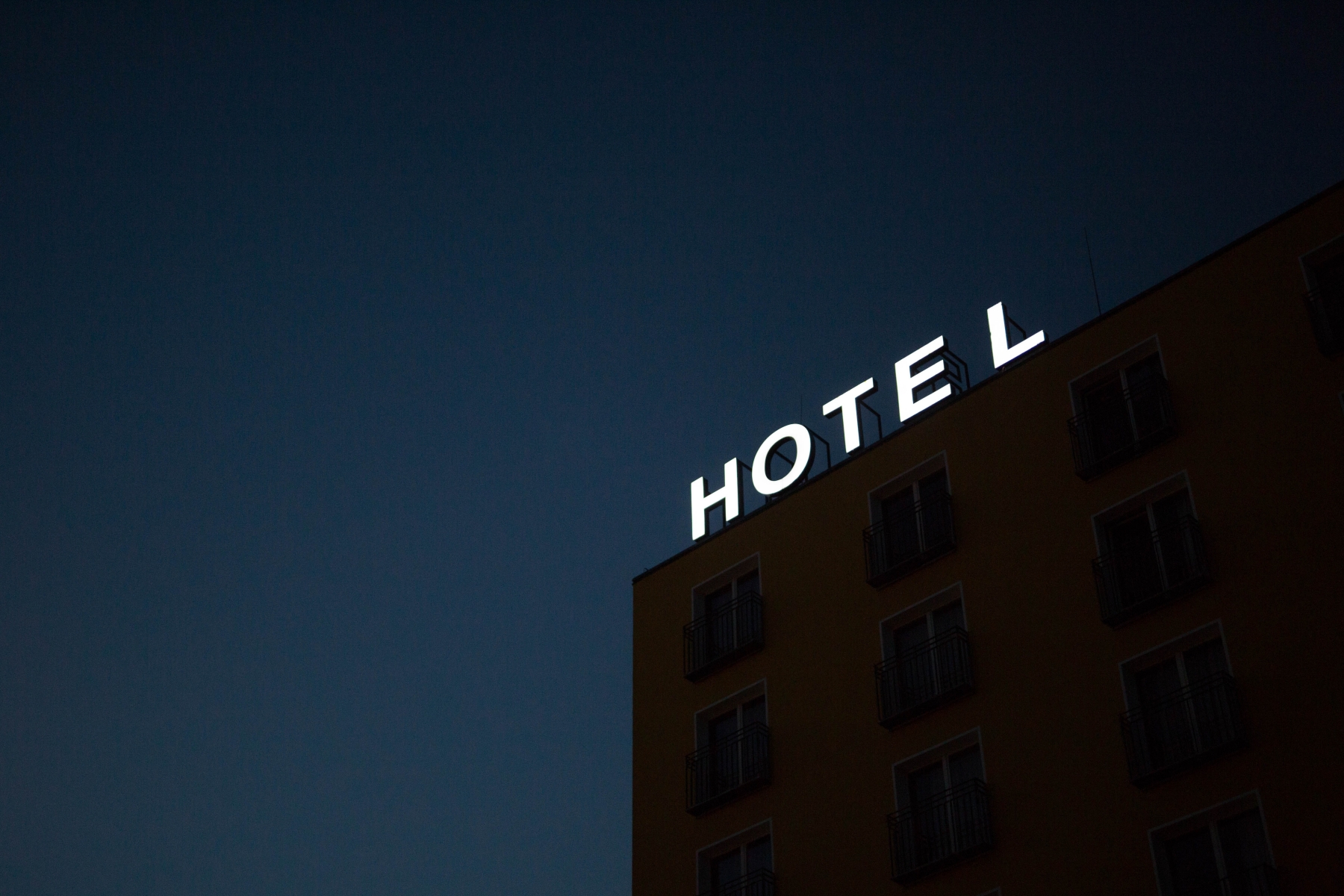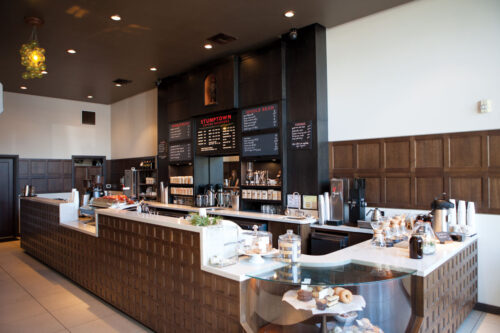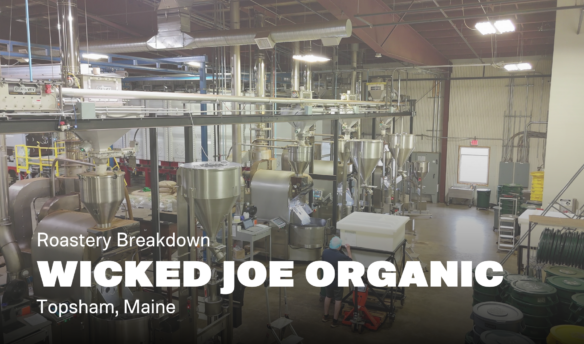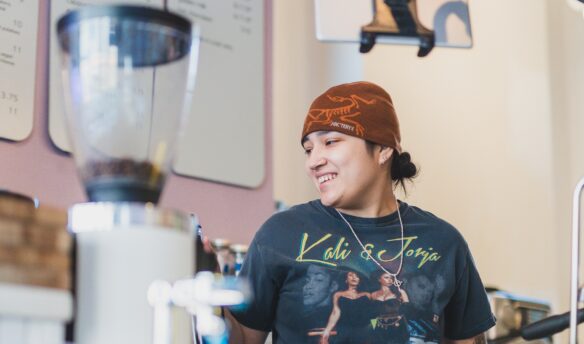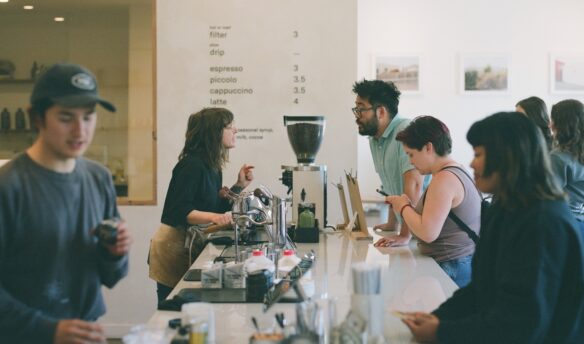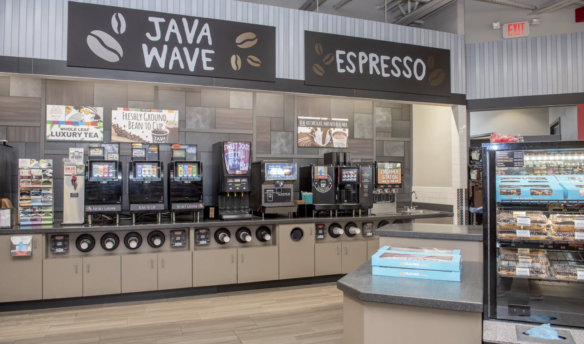A hotel guest could usually count on a packet of ground beans and a cheap coffeemaker for their morning cup. Then hotels started outfitting their rooms with slick pod machines that could extract coffee in seconds flat.
Maybe, down in the lobby, there would be a cookie-cutter coffee shop. Even in the best foodie-driven hotels, coffee was an afterthought, and freshness and an artisan touch were noticeably absent.
Now, forward-looking hotels are shining a spotlight on some of the country’s best artisan roasters, bringing their coffee programs into a new era. It’s a seamless marriage that blends the needs of the boutique-hotel industry with coffee roasters eager to expand into other markets. Partnering with an existing retailer avoids marketing from the ground up and hunting down the perfect storefront, saving cash and time.
Checking In
Last August, the 1,600-room SLS Las Vegas debuted—a sibling to three other SLS Hotels in Miami’s South Beach, the Bahamas, and Beverly Hills. SLS’s senior vice president of restaurant operations, Matt Erickson, knew he wanted top-notch coffee choices for guests.
“We’re all foodies,” he says, noting that the average check price at most SLS Hotel restaurants is between $70 and $100. “We’re very cognizant that we want our coffee offering to be exceptional.” With rooms costing an average of $200 a night, a design partnership with Philippe Starck, and a celebrity chef–backed eatery (Bazaar Meat by José Andrés), sub-par coffee would not do.
Building on a partnership already in place at the SLS Hotels in Miami and Beverly Hills with LAMILL Coffee, a roaster tucked into Los Angeles’ Silver Lake neighborhood, Erickson didn’t hesitate to sign the same roaster to operate the hotel’s café.
“Operating your own retail space is a challenge,” says Casha Garcia, LAMILL’s Coffee’s relations manager. LAMILL didn’t hesitate to accept Erickson’s offer—now, guests can order coffee at the Perq, a modern café with bar-height seating inside the hotel. Everything is made in house, including the caramel syrup drizzled on top of mochas and batches of cold-brew coffee made from a blend of Brazilian, Costa Rican, and Guatemalan beans.
Still, the tight space was an adjustment, and the team spent two months training staff in the new café. The hotel’s pastry chef supervises a kitchen staff of five to craft savory and sweet treats that include croissants, paninis, gelato, and danishes. “On a busy day, we do thousands of covers,” says Erickson.
Concierge Desk
In Boston, this fall, the 1,700-square-foot George Howell Coffee Café arrives in the lobby of the Godfrey Hotel in the up-and-coming Downtown Crossing neighborhood, slated for an early-October opening.
“So many businesses were knocking down our door, but we were very selective, as a lifestyle brand with 242 rooms,” says Larry Casillo, the hotel’s general manager. “George Howell, as an artisan and one with a significant amount of history, seemed like a good fit. Having one of the best in the business at our fingertips was really a no-brainer. Everyone seems to know who George Howell is, and if you were in Boston fifteen to twenty years ago, you definitely knew who he is.”
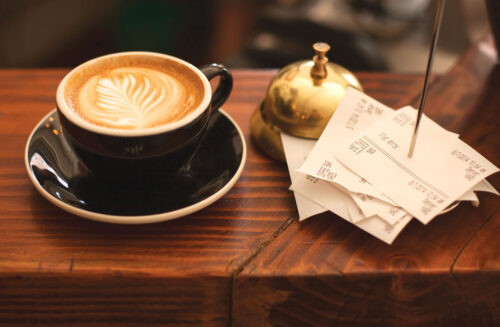
One key value of the hotel brand—there is also a Godfrey in Chicago, open since 2014—is to encourage guests to engage in acts of discovery. In other words, experiences are not merely handed over, and instead, they are immersive.
This includes coffee. The café will be designed to welcome conversation between baristas and customers, similar to an open kitchen or chef’s table at restaurants. It will also carve out an all-day concept with European-style seating (tables close together to encourage conversation), coffee flights, food prepared on site (sandwiches for breakfast and lunch), and pastries from local bakeries.
For coffee roasters wanting to break into this budding market, Casillo advises it’s best to offer a “spectrum of experiences.”
“What I like about what George Howell offers is he has highly individualistic [coffees],” says Casillo, referring to Howell’s relationships with coffee farms and only offering single-estate coffees brewed-to-order, “and they share really good stories to boot. He’s ticking every box.”
Howell couldn’t agree more about the marriage. After spending several years scouring Boston for the perfect spot to open a café, he hit upon Downtown Crossing, home to two universities, condo dwellers, and high-tech companies. “It’s everything. It’s the precise location of this hotel, in the absolute center of downtown, where pedestrian activity meets business seven days a week,” he says. “The hotel is a real hub of culture and business.”
“What the hotel really aims at is a twenty-four to thirty-five age group, which is a group we are really interested in,” says Howell. “They are the ones who have been behind the third wave.”
Serving Up Locals
Like the Perq at SLS Hotel in Las Vegas, there’s an eye on offering a positive, friendly experience while ordering drinks in hotels. But Howell plans to cater to locals as much as he does hotel guests.
Among the early specialty cafés to partner with hotels was Stumptown Coffee Roasters. “Stumptown has started it in a big way,” says Howell. In 2007, the roaster opened a café at Ace Hotel in its hometown of Portland, followed by another at Ace Hotel in New York City two years later. Stumptown coffees are also brewed at Ace Hotels in Palm Springs, Los Angeles, and—come December—Pittsburgh.
“We stayed at Ace Hotel [in Seattle] in the early days and thought it was great,” says Matt Lounsbury, vice president of Stumptown. “We became buddies with [the founders] over the years, and Duane, our founder, was from Seattle. There are definitely crossovers in the brand, aesthetic, and vibe.”
Still, he realizes the customer demographic isn’t the same at every Ace Hotel, given the range of cities they’re in. But one common denominator is a thirst for good coffee— many haven’t yet been turned on to Stumptown. “People are spending a lot of money to stay there, and they should be able to get good coffee,” says Lounsbury.
Coffee fits right into a hotel’s toolkit. “We’re seeing a trend for hotels to be ahead of amenities for their guests. As the bar gets raised for food and drink…people don’t want to leave the hotel to get it,” Lounsbury says. Proof of this thirst for good coffee is at the New York City Ace Hotel café. “It’s bonkers busy all day long. There’s a lot of foot traffic,” he says.
New Cities, New Opportunities
Another New York City boutique hotel—the High Line Hotel—turned to a boutique coffee roaster to help its brand sparkle when opening in 2013. This marked Chicago-based Intelligentsia Coffee’s first foray into the Northeast.
“We had been looking for a way to enter the New York market,” says Stephen Morrissey, Intelligentsia’s communications director. He helped design the café’s interior inside the shell of a former seminary in Chelsea. There is also a coffee truck parked in the courtyard during warmer months. “The hotel operators had been to our coffee bars, and they approached us,” he says. “Part of that motivation is that hotels want to create a different interactive experience in their lobbies.”
What Intelligentsia got wasn’t just another tiny metropolitan-sized café. The café has access to seating for 150, huge for a New York City coffee shop, with flow between the interior and outdoor gardens. “It’s not the kind of space that allows a line to form,” says Morrissey. “We designed it so people could walk up to the bar and place and order.”
The benefits of a coffee roaster entering a hotel go beyond broadening market reach. The brand can evolve into something with artistic flair as today’s hotel guests like curated experiences that showcase a sense of place and origin, paired with a focus on quality. Coffee is the perfect partner in this effort as it continues to elevate from a commodity beverage to an artisan sip.
Any hotel partner has to also hold a fondness for premium sourcing. “We wanted to ensure we weren’t ‘fill in the blank’ for the Best Western. To have a coffee shop on every corner, that’s not our business model,” Morrissey says. “The hotel provided a really unusual opportunity for us.”
Kristine Hansen is a freelance writer based in Milwaukee.
This article was originally published on September 28, 2015, and has been updated to reflect Fresh Cup’s current editorial standards. Cover photo by Marten Bjork.



